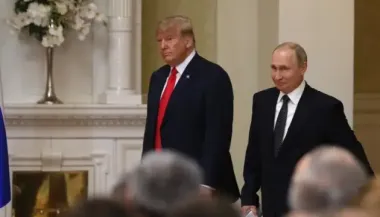Russia intensifies the spread of fake news about Ukraine ahead of the Trump-Putin meeting

Russia intensifies wave of fake news about Ukraine amid Trump-Putin meeting
Before and after the scheduled meeting between US President Donald Trump and dictator Vladimir Putin in Alaska, Russian propagandists are intensifying campaigns to discredit Ukraine as a negotiating party.
The main messages are Kyiv's alleged unwillingness to achieve peace, blocking the process, making unrealistic demands, and emphasizing Ukraine's dependence on Russia and the US in deciding its fate.
They will especially insist on the idea that only Moscow and Washington have control over European security, and that Europe is allegedly incapable of acting independently.
This is part of an attempt to destroy international solidarity and sow division between Kyiv, Washington, and the European Union.
Amidst the pause in real exchanges , the enemy is launching fakes about Ukraine's "selective approach" to the release of prisoners of war, the alleged refusal to take back its own, and the "opacity of negotiations."
Staged appeals and manipulative interviews will be disseminated, aimed at provoking emotional resonance among the families of prisoners and putting pressure on the Ukrainian authorities.
Amid preparations for the Zapad-2025 strategic exercises , Russia and Belarus are preparing informational interventions about the alleged buildup of forces near the borders of Ukraine and the threat of a new invasion from the north.
Despite the lack of real changes at the border, such messages are intended to create an atmosphere of fear and uncertainty among the Ukrainian population.
Russian propagandists plan to actively discredit Ukrainian statehood, national symbols, and the right to independence.
Among the tools are pseudo-historical narratives about the "artificiality" of Ukraine, the "disintegration of a single people," and the "absence of a true state tradition." Rumors of "missile strikes" and terrorist attacks are also expected to spread to sow panic among citizens.
Using the tragic events of 2014, in particular Ilovaisk, Kremlin propagandists will try to demoralize Ukrainian society by shifting responsibility for the losses to the Ukrainian command, while keeping quiet about Russia's aggression.
Special attention will be paid to social networks, in particular TikTok, to influence the youth audience.
Russia will attempt to portray Dugin as a victim of "Ukrainian terrorism" and play the role of the injured party, emphasizing alleged attacks on civilians. Commemorative events will be actively covered to shape the international image of Ukraine as a "radical regime."
On the eve of the parliamentary elections in Moldova (September 28), the Kremlin is intensifying propaganda aimed at discrediting the pro-European government, undermining trust in the electoral process, and splitting the diaspora.
The main focus is on the topic of "political prisoners" and repressions against pro-Russian forces.
Russia will try to use the Shanghai Cooperation Organization summit and Putin's visit to China to demonstrate its alleged geopolitical strength and support from Asian countries.
This should undermine faith in Western support for Ukraine and create the impression of a "change in the world course" in favor of Moscow.








